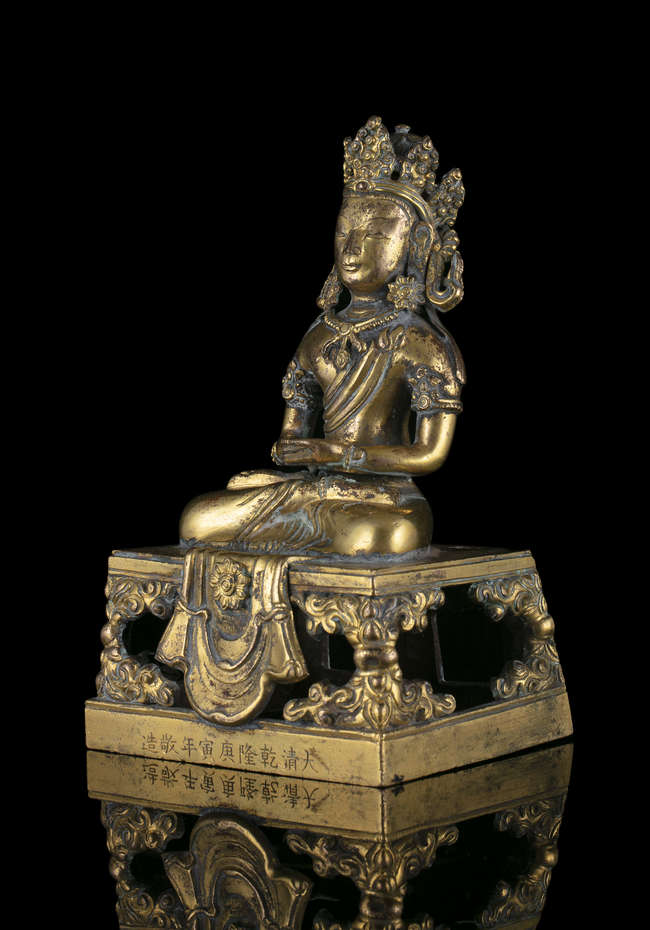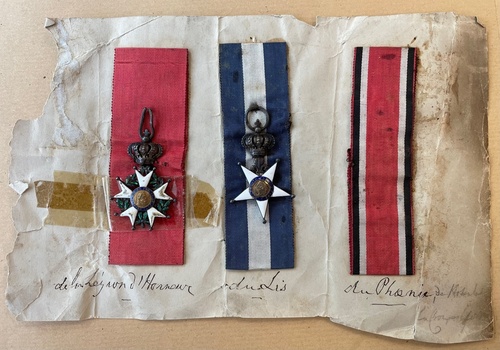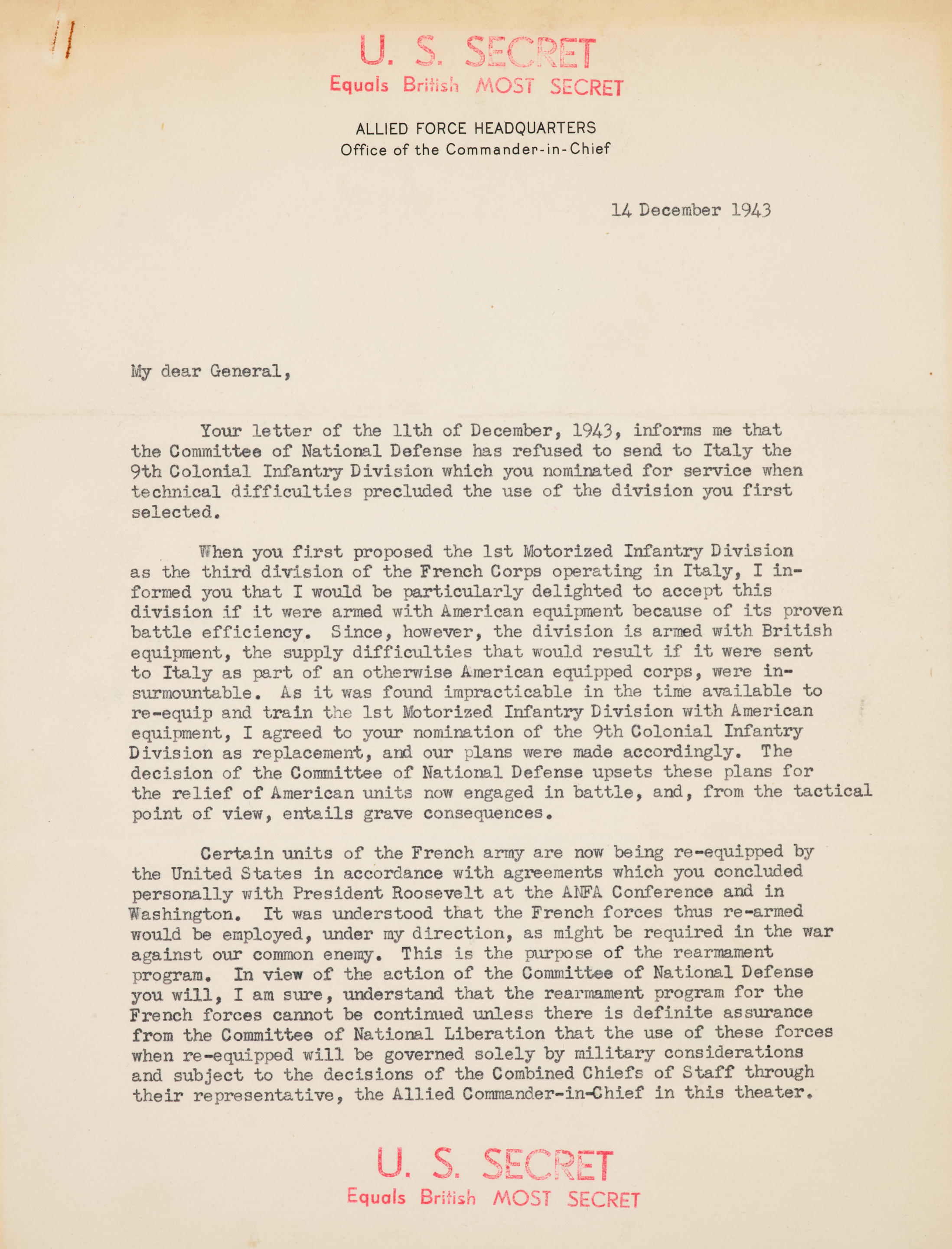Lot of 19+ items. There are 4 notes related to the Czechoslovakian Order of the White Lion. The first is dated Aug. 31, 1934 from the First Secretary of the Czech. Legation in Washington telling Wiley's secretary that he does not know anyone from whom Mr. Wiley can obtain a rosette boutonnier of the Order for the dinner on Tuesday. They must be ordered from Prague. The other three notes are typed with initial signatures also trying to locate or make a boutonnier, all dated Sept. 4, 1934. But apparently they were able to obtain a ribbon that Wiley could wear as a substitute for the rosette. The other items are truly miscellany, including a ticket to the Monmouth County Horse Show; a give-away card from Tom Thumb jujubes; a food conservation card from the first World War ("Guests are respectfully requested to remember the needs of Great Britain and her Allies and the Armies at the front. The Food Controller requires the Public to do everything in their power to conserve Wheat, Beef and Bacon so that these commodities may be available for export. This can best be done by eating as little of these as possible, by using substitutes and by avoiding waste."); an unidentified 1.5 in. sq. silver gelatin photo of a little girl, possibly in ethnic costume; a New York Central Railroad schedule; a Russo-Japanese Peace Commission postcard addressed to Claire Wiley; a couple of business cards, one with a note on verso, a few advertising envelopes; a holiday greeting of card with illustration of St. Rombold's Cathedral Mechlin; two letters concerning acquiring a TV - dated 1949 - early in the "television craze;" and a Hamilton (Canada) Spectator for December 8, 1941, reporting the aftermath of the bombing of Pearl Harbor. Louis Wiley was born in Homell, Steuben County, NY in 1869. The family moved shortly after to Mt. Sterling, KY, then to Ft. Wayne, IN. Even as a child, he left an impression on all with whom he came in contact as energetic, enthusiastic and always trying to do his best. He decided in childhood that he wanted to be in the newspaper business. His father died when he was 17, and the family moved to Rochester, where he began working for the Union and Advertiser, and soon moved to the Post Express, while also publishing his own paper, Jewish Tidings. By the age of 26, he decided to try his luck in the "Big Apple." So, with a pile of recommendations solicited from everyone he knew, he struck out on his own, away from family and friends. He immediately went to work for the New York Sun, but found that it did not offer the opportunity he was seeking, so he looked elsewhere. In one of those fortuitous historically important events, the New York Times, which had been losing money for a long time, was taken over by Adolph S. Ochs, and he saw Wiley's energy as just what the Times needed for a revival, although he remained skeptical about Wiley's business sense. Wiley knew this was his "calling" as it were, and by 1906 he was the Times' business manager, a position he held until his sudden death in 1935. Ochs and Wiley did rescue the paper, although not always in agreement on the direction it should take. Ochs, for example, did not like ads that contained testimonials, nor did he like colored comics, both of which Wiley favored. Eventually Wiley became proficient in all aspects of the newspaper business, and in addition to being a writer occasionally, he was an excellent public speaker and would go anywhere at any time and positively represent the newspaper. With his energy and all of his connections, he was a favorite, not only of New York, but of the world. He was given awards by nearly every nation in Europe. He was also extremely organized, with file cabinets full of communication from many of these sources. After Louis Wiley's death, many of the papers that were deemed as having "sentimental significance" were returned to their writers. Likely the Times kept a number of them. Many of the remainder were donated to the University of R
Lot of 19+ items. There are 4 notes related to the Czechoslovakian Order of the White Lion. The first is dated Aug. 31, 1934 from the First Secretary of the Czech. Legation in Washington telling Wiley's secretary that he does not know anyone from whom Mr. Wiley can obtain a rosette boutonnier of the Order for the dinner on Tuesday. They must be ordered from Prague. The other three notes are typed with initial signatures also trying to locate or make a boutonnier, all dated Sept. 4, 1934. But apparently they were able to obtain a ribbon that Wiley could wear as a substitute for the rosette. The other items are truly miscellany, including a ticket to the Monmouth County Horse Show; a give-away card from Tom Thumb jujubes; a food conservation card from the first World War ("Guests are respectfully requested to remember the needs of Great Britain and her Allies and the Armies at the front. The Food Controller requires the Public to do everything in their power to conserve Wheat, Beef and Bacon so that these commodities may be available for export. This can best be done by eating as little of these as possible, by using substitutes and by avoiding waste."); an unidentified 1.5 in. sq. silver gelatin photo of a little girl, possibly in ethnic costume; a New York Central Railroad schedule; a Russo-Japanese Peace Commission postcard addressed to Claire Wiley; a couple of business cards, one with a note on verso, a few advertising envelopes; a holiday greeting of card with illustration of St. Rombold's Cathedral Mechlin; two letters concerning acquiring a TV - dated 1949 - early in the "television craze;" and a Hamilton (Canada) Spectator for December 8, 1941, reporting the aftermath of the bombing of Pearl Harbor. Louis Wiley was born in Homell, Steuben County, NY in 1869. The family moved shortly after to Mt. Sterling, KY, then to Ft. Wayne, IN. Even as a child, he left an impression on all with whom he came in contact as energetic, enthusiastic and always trying to do his best. He decided in childhood that he wanted to be in the newspaper business. His father died when he was 17, and the family moved to Rochester, where he began working for the Union and Advertiser, and soon moved to the Post Express, while also publishing his own paper, Jewish Tidings. By the age of 26, he decided to try his luck in the "Big Apple." So, with a pile of recommendations solicited from everyone he knew, he struck out on his own, away from family and friends. He immediately went to work for the New York Sun, but found that it did not offer the opportunity he was seeking, so he looked elsewhere. In one of those fortuitous historically important events, the New York Times, which had been losing money for a long time, was taken over by Adolph S. Ochs, and he saw Wiley's energy as just what the Times needed for a revival, although he remained skeptical about Wiley's business sense. Wiley knew this was his "calling" as it were, and by 1906 he was the Times' business manager, a position he held until his sudden death in 1935. Ochs and Wiley did rescue the paper, although not always in agreement on the direction it should take. Ochs, for example, did not like ads that contained testimonials, nor did he like colored comics, both of which Wiley favored. Eventually Wiley became proficient in all aspects of the newspaper business, and in addition to being a writer occasionally, he was an excellent public speaker and would go anywhere at any time and positively represent the newspaper. With his energy and all of his connections, he was a favorite, not only of New York, but of the world. He was given awards by nearly every nation in Europe. He was also extremely organized, with file cabinets full of communication from many of these sources. After Louis Wiley's death, many of the papers that were deemed as having "sentimental significance" were returned to their writers. Likely the Times kept a number of them. Many of the remainder were donated to the University of R











/54936/Internet%20Image%201.jpg)



Try LotSearch and its premium features for 7 days - without any costs!
Be notified automatically about new items in upcoming auctions.
Create an alert